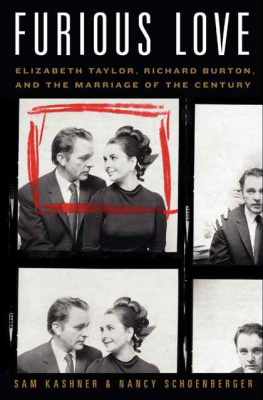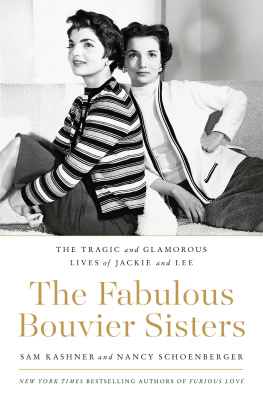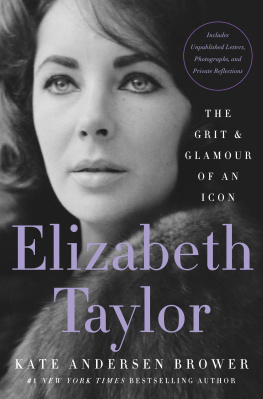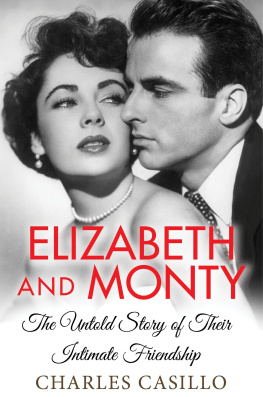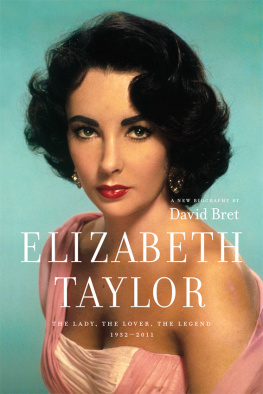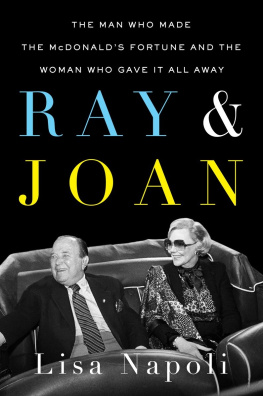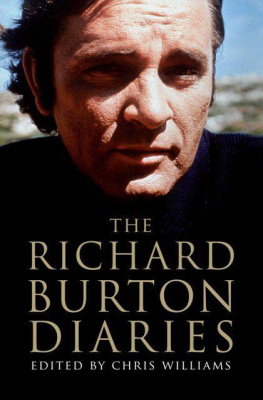I am forever punished by the gods for being given the fire and trying to put it out. The fire, of course, is you.
R ICHARD B URTON
Since I was a little girl, I believed I was a child of destiny, and if that is true, Richard Burton was surely my fate.
E LIZABETH T AYLOR
W hen asked by Time magazine a few years ago to name the five great love affairs of all time, the Texas-born gossip columnist Liz Smith didnt even have to think about who would occupy first place. The Burtons, of course. Richard Burton and Elizabeth Taylor were the most vivid example of a public love affair that I can think of. The Burtons and the Lindbergh baby being kidnapped and Kennedys assassinationthese are the biggest stories of our time. Whenever somebody says, So and so is a big star, I say, Have they been condemned by the Vatican?
Their thirteen-year saga was the most notorious, publicized, celebrated, and vilified love affair of its day. Indeed, their ten-year marriage, followed by a divorce, remarriage, and a final divorce, was often called the marriage of the century in the press. Just thirty years earlier, the Duke of Windsor had embarked upon his own famous marriage, to Wallis Simpson, giving up the throne of England to marry the American divorce from Baltimore. A nation wept, but the Duke and Duchess of Windsor went on to rule a shadow empire of jet-setters, aristocrats, gigolos, international bon vivants, in a floating world of yachts, dance floors, casinos, and the homes and hotels of the very rich. So famous were the Burtons in the 1960s and 1970s that the duke and the duchess were their only peers, the only other couple who knew what it was like to be pariahs for a time, to pay a high price for their choices, and to live the rest of their lives in isolated luxury. But the notorious Burtons managed to win their way back into the hearts of the American public through sheer talent, hard work, chutzpah, and glamour. On the face of it, said columnist Smith, Elizabeth Taylor was just totally arrogant. Shed walk out in capri pants and her Cleopatra makeup and her kerchief and go off to whatever local restaurant and drink up a storm with Burton. Thats part of what excited the public: her vulgarity and her arrogance and the money. Oh God, their love story had everything.
It also brought us the modern accoutrements of celebrity: the relentless paparazzi, the continuous press exposure, the public airing of private grief. In short, it brought us Liz and Dick, a tabloid shorthand that they hated but that stood for everything extravagant and over-the-top about their all-too-public lives.
In fact, you might say there were two marriages: the ballyhooed union of Liz and Dick and the private marriage of Richard and Elizabeth. More often than not, Liz and Dick overwhelmed the private marriage, holding it hostage and ultimately helping to destroy it. The yachts, the glamorous ports of call (Monte Carlo, Portofino), the grand hotels of the world, the fabled jewels, the homes in London, Gstaad, Cligny, and Puerto Vallarta, the hobnobbing with the Rothschilds, Ari Onassis, General Tito of Yugoslavia, and, of course, the Windsors. They were indeed Hollywood royalty. But like any other married couple, they had to deal with children coming of age during the cultural upheavals of the 1960scommunes, family squabbles, balancing two careers (even if their careers meant making some of the most remarkable films of the 1960s)in short, the real marriage of two people trying to live their lives together.
If Burton had entered into the pact with impure motives, he quickly found himself utterly bewitched. He discovered in Elizabeth the embodiment of all the women in Wales he had loved or lusted after: from his sainted sister who had raised him to the dark-haired Welsh tarts he knew as a randy youth in the towns of Pontrhydyfen and Port Talbot. My blind eyes are desperately waiting for the sight of you, he would write to her well into their marriage. You dont realize of course, E. B., how fantastically beautiful you have always been, and how strangely you have acquired an added and special and dangerous loveliness. Your breasts jutting out from that half-asleep languid lingering body, the remote eyes, the parted lips.
For Elizabeth, this was the one true marriage. When she agreed to share with us letters that Richard Burton had written to her in the last few years of their life together, she wanted us to know the place he held, and continues to hold, in her heart. She wrote to us,
Richard was magnificent in every sense of the wordand in everything he ever did. He was magnificent on the stage, he was magnificent in film, he was magnificent at making loveat least to me. He was the kindest, funniest, and most gentle father. All my kids worshipped him. Attentive, lovingthat was Richard. The bond with all of us continued until he drew his last breath. We knew he was absolutely there for us no matter what. In my heart, I will always believe we would have been married a third and final timefrom those first moments in Rome we were always madly and powerfully in love. We had more time but not enough.
Of the nearly forty letters Richard wrote to Elizabeth, perhaps the most important was written shortly before his untimely death on August 5, 1984, at the age of fifty-eight. He was in the attic study of his beloved house in Cligny, Switzerland, a home he shared with his fourth wife, Sally Hay Burton, when he wrote what would turn out to be his final letter to Elizabeth. He had recently completed work in Michael Radfords adaptation of George Orwells 1984 , ironically the year of Burtons death, in what would be a brief but powerful performance. His costar, the English actor John Hurt, was staying with Richard and Sally for a few days, but Richard managed to slip away and sequester himself in the study. Surrounded by his treasured thousand volumes of The Everyman Librarya gift from Elizabethhe wrote to her at her home in Bel Air in Los Angeles.
But by the time Elizabeth received the letter, Richard Burton was dead. He had gone to bed with a terrible headache, and sometime during the night he suffered a cerebral hemorrhage. Elizabeth was barred by Richards widow from attending his funeral in Cligny, for fear of the disrupting crowds and paparazzi that still followed Elizabeth wherever she went. That letter would be her most cherished remembrance of the thirteen years, all told, they spent together in the whirlwind of their grand affair.
But what was in that letter?
LE SCANDALE
I did not want to be another notch on his belt.
E LIZABETH T AYLOR
How did I know the woman was so fucking famous?
R ICHARD B URTON
T he first time Richard Burton laid eyes on Elizabeth Taylor, he nearly laughed out loud.
It was 1953, and Burton had been plucked from the London stage where he was being hailed as the great successor to Sir John Gielgud and Sir Laurence Olivier, to make three dramas for 20th Century-Fox My Cousin Rachel , The Robe , and The Desert Rats . He had swooped into Hollywood with his Welsh wife, Sybil, and had cut a swath through willing Hollywood wives, earning a reputation as an irresistible lover, a great raconteur, a rough and randy Welshman, a powerful drinker. At a party at Stewart Granger and Jean Simmonss house in Bel Air, the twenty-eight-year-old actor outdid himself in drinking and storytelling. It was the Welsh actors first time in California, and his first visit to a swank house, where he was agog at the suntanned beauties lounging around the largest swimming pool he had ever seen. The hot desert air was cooled by the sound of ice clinking in glasses, and Bloody Marys, boilermakers, and ice-cold beer kept the party well lubricated. It had been a hell of a year, Burton would later write in his frank and colorful notebooks, his diary entries recorded for a possible autobiography. Three big movies; drinking with Bogie; flirting with Garbo He recalled,

